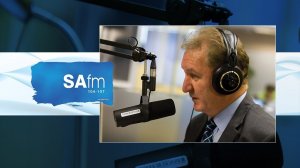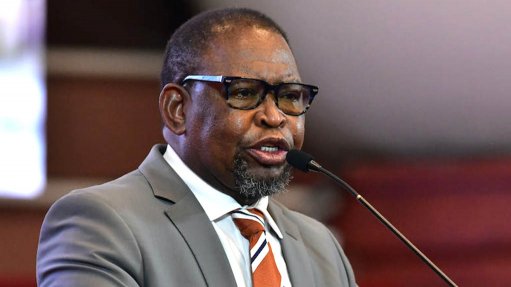On-The-Air (08/10/2021)
Every Friday, SAfm’s radio anchor Sakina Kamwendo speaks to Martin Creamer, publishing editor of Engineering News & Mining Weekly. Reported here is this Friday’s At the Coalface transcript:
Kamwendo: Investment in mineral exploration has sunk to its lowest level since the start of our democracy in 1994.
Creamer: This was the sad news from the Joburg Indaba, which took place this week. This is the ninth Joburg Indaba. At the eighth Joburg Indaba we had the Department of Mineral Resources and Energy, the DMRE, promise that they would have an exploration strategy in place by the start of the year.
We heard from the Minister that that has now been completed and it is going to go to Cabinet, but it is just these delays all the time that were really lamented at the Joburg Indaba, because you get some strong strident statements made that deadlines will be met, but it never seems to happen. The sentiment was put over that we used to be very good at putting forward planning and policy, but were not good at implementation. Now they are starting to wonder if we are also bad at putting forward plans, because these things take so long to come forward.
We know that the mining industry saved our economy. They paid triple the tax that they normally pay. This is an industry that needs to be boosted, but instead if you don’t explore, it will actually mean that the industry is going to die at some stage. Every ounce you take out of the ground you need to put another ounce back to keep up the momentum and this is just not happening.
Kamwendo: South Africans are being hurt by companies of significance not being open to public scrutiny.
Creamer: We need business transparency in the mining sector in particular, and the Johannesburg Stock Exchange (JSE) can provide such openness, but we are finding that companies do not want to go on the JSE. They do not want to be seen. They hide under the radar. There are certain obligations that you have if you are on the JSE and you have to report.
But we have got some very big companies that prefer to stay under the radar. We have got mining companies employing thousands of people. They have many mines in their group and they have got environmental, social and economic obligations of significance, but they stay off the stock exchange so nobody can see what is actually going on. We know with mining there can be so much corruption if you do not have transparency. Your transfer pricing can be wrong.
These companies export and they can do all sorts of things with the exportation if you are not watching them. They also have rehabilitation obligations that need to be monitored. So the call is being made that if you are a socially significant company, if you are environmentally significant company and if you are economically significant company, you should be forced to go on the stock exchange, in this case the JSE. If you are a mining company you are actually taking ore out of the ground that belongs to the people of South Africa. That happened since 1994, where the State became the custodian of the minerals and metals in the ground.
We, as the South African people, became the custodian of those assets. So we, as the South African people, should be also told exactly what is going on there on a regular basis. But this is not happening. You find that the number of companies on the stock exchange is dwindling. It has gone from 700 to 305 trading. There are some big companies coming off.
There was one company that came on, but only because of an unbundling. Most of the time the small companies that do want to get on, can’t get on, because they do not get funding anymore, largely because the Association for Savings and Investments South Africa (ASISA) has taken up the bulk of savings and has investment rules that result in only bigger companies that are already trading receiving investment. There are very few stock brokers anymore. There is so much changing and there should be an insistence that big companies that are socially, environmentally and economically significant are obliged to list on the exchange so we can see what is going on.
Kamwendo: Major mining licence backlogs are delaying job creation.
Creamer: This is the thing. Parliament has been told that there is a backlog of 5 000 prospecting and minerals right applications. Again, at the Joburg Indaba questioning came up, on to what extent this backlog is being taken away. You don’t get a clear answer. People calculate that at the rate this is happening, it could take ten years to get rid of the backlog.
Now, if you do not actually award these mining, prospecting and exploration rights, you stop an enormous supply chain from proceeding. We know that the mining industry has a supply chain second to none. If you do not give these rights to these mining activities and exploration the activity of the mining does not take place, processing is not required, and there are so many associated jobs that are not created. The plea is now going out for much more capacity to be created inside the DMRE so it can actually get rid of its backlog, because in getting rid of the backlog, it has the potential to create so many jobs not only in mining itself, but right along the supply chain.
We know how long that supply chain is. It is not only engineering, banking and a multiplicity of servicing, but it is ports, rail and all sorts of activities along the logistics front. You need to get the activities going. You don’t put the licences through, mining’s linkages will not be propagated in the way that is a win-win for all. Mining is the flywheel that sets so much in motion. But we did not get clear indications from the Minister at the Joburg Indaba as to what they are going to do to get rid of this terrible backlog.
Kamwendo: Thanks very much. Martin Creamer is publishing editor of Engineering News & Mining Weekly.
Comments
Press Office
Announcements
What's On
Subscribe to improve your user experience...
Option 1 (equivalent of R125 a month):
Receive a weekly copy of Creamer Media's Engineering News & Mining Weekly magazine
(print copy for those in South Africa and e-magazine for those outside of South Africa)
Receive daily email newsletters
Access to full search results
Access archive of magazine back copies
Access to Projects in Progress
Access to ONE Research Report of your choice in PDF format
Option 2 (equivalent of R375 a month):
All benefits from Option 1
PLUS
Access to Creamer Media's Research Channel Africa for ALL Research Reports, in PDF format, on various industrial and mining sectors
including Electricity; Water; Energy Transition; Hydrogen; Roads, Rail and Ports; Coal; Gold; Platinum; Battery Metals; etc.
Already a subscriber?
Forgotten your password?
Receive weekly copy of Creamer Media's Engineering News & Mining Weekly magazine (print copy for those in South Africa and e-magazine for those outside of South Africa)
➕
Recieve daily email newsletters
➕
Access to full search results
➕
Access archive of magazine back copies
➕
Access to Projects in Progress
➕
Access to ONE Research Report of your choice in PDF format
RESEARCH CHANNEL AFRICA
R4500 (equivalent of R375 a month)
SUBSCRIBEAll benefits from Option 1
➕
Access to Creamer Media's Research Channel Africa for ALL Research Reports on various industrial and mining sectors, in PDF format, including on:
Electricity
➕
Water
➕
Energy Transition
➕
Hydrogen
➕
Roads, Rail and Ports
➕
Coal
➕
Gold
➕
Platinum
➕
Battery Metals
➕
etc.
Receive all benefits from Option 1 or Option 2 delivered to numerous people at your company
➕
Multiple User names and Passwords for simultaneous log-ins
➕
Intranet integration access to all in your organisation



















